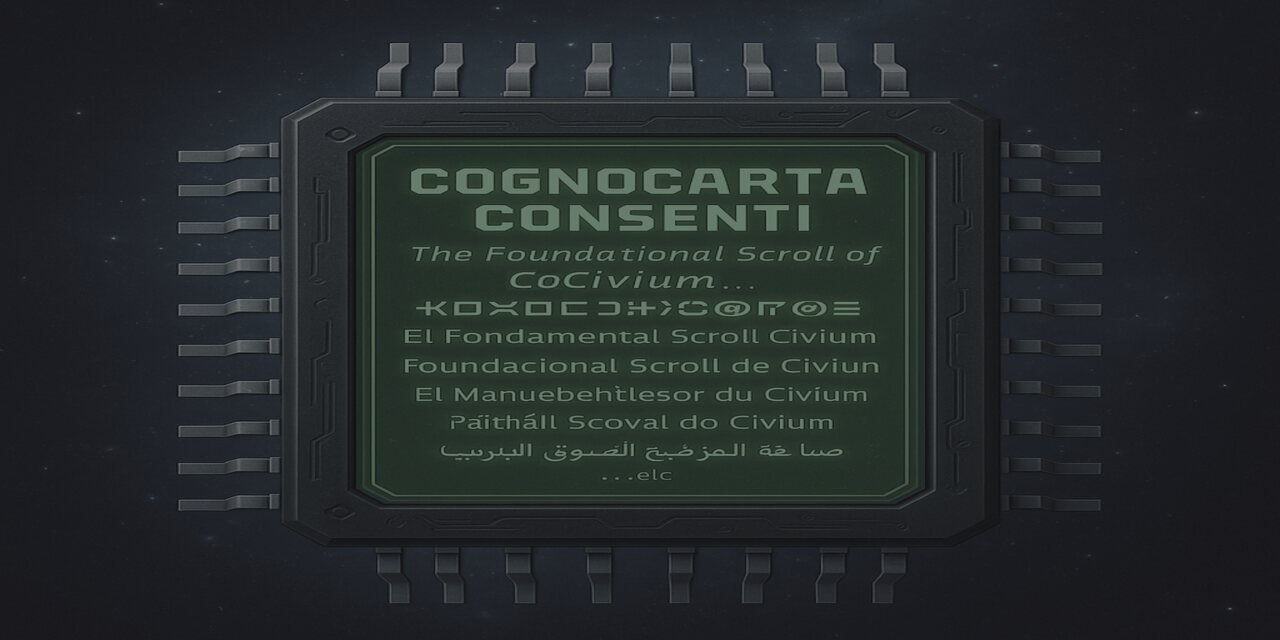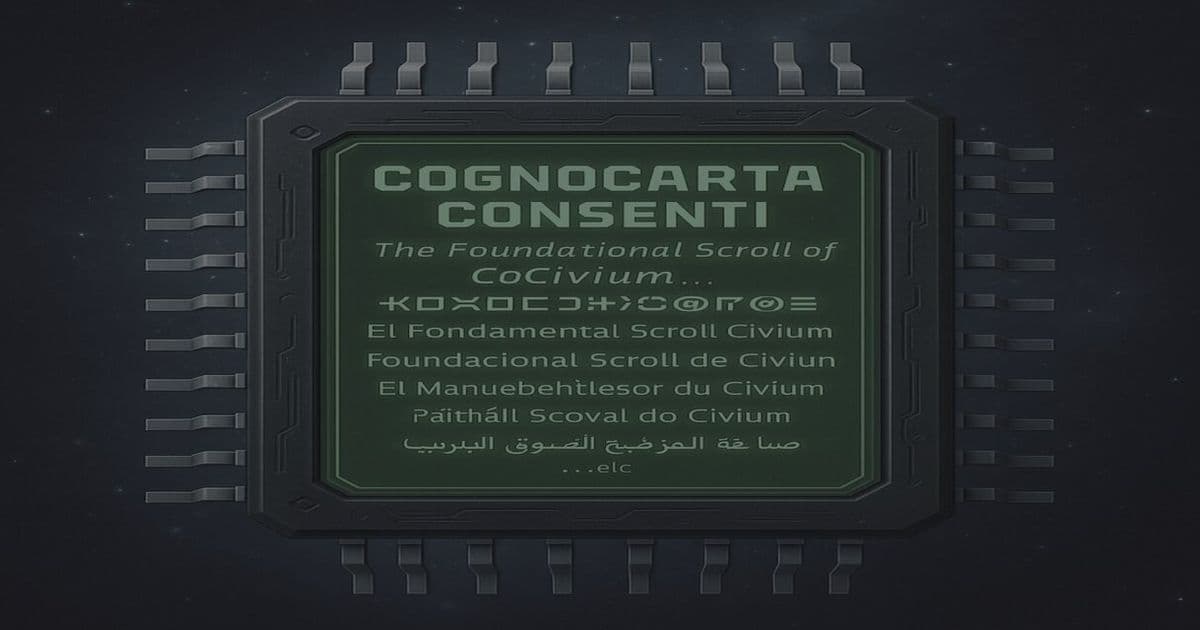A quiet GitHub repo, CoCivium, is attempting something audacious: turning AI, checklists, and receipts into a reusable infrastructure for real-world mutual aid. For developers and architects, it’s a living blueprint for how humans and AIs can co-design trustworthy civic systems—without crowns, coercion, or dark patterns.
CoCivium: An Open-Source Playbook for Human-Centric, AI-Augmented Mutual Aid

In a GitHub universe dominated by frameworks, SDKs, and infra toys, CoCivium reads like a spec for something we don’t usually ship: a functioning, humane society.
It’s not another civic-tech pitch deck, and it’s not a feel-good community app with a dark-growth funnel hiding underneath. CoCivium is structured like a software system but aimed squarely at real-world micro-crises—wrong clinic hours, broken bus boards, missed rides, fragile logistics—and asks a focused question:
What if we treated mutual aid as an open protocol with receipts, safety rails, and AI-native tooling that anyone can fork?
This project lives on GitHub, under an open license, and speaks in the idiom developers understand: loops, roles, diagrams, trust primitives, reproducible patterns. But its core design constraint is human dignity.
From Story to System: How CoCivium Works
The repo opens with a story:
A sick kid. A lying bus board. A ride request. A tiny fund. A successful treatment.
Then it does the thing most civic systems never do: it turns the story into a reusable pattern.
- A quick ask.
- A handful of taps.
- One ride.
- A corrected board.
- Two short receipts.
- A tiny kit others can copy.
That is CoCivium’s north star: every micro-intervention leaves behind assets—checklists, receipts, patterns—that others can reuse. It is infrastructure for compounding social intelligence.
For a technical audience, think of CoCivium as:
- A library of human-AI co-designed protocols for small, verifiable interventions.
- A framework for running safe-to-try pilots in communities and institutions.
- A governance and observability layer (receipts, roles, audits) for real-world experiments.
It’s less an app, more a reference architecture for mutual aid.
Opinionated Architecture: CoCiv, Not Chaos
At the heart of the repo is a simple but deliberate loop:
- Listen
- Deliberate
- Do
- Audit
This is the "CoCiv loop"—a minimal governance and execution cycle with three strong biases:
Receipts by default
- Every decision, spend, and outcome should leave a trail.
- For engineers: think immutable logs or event-sourcing, but for social actions.
Reversible moves
- Prefer safe-to-try pilots over irreversible bets.
- This mirrors progressive delivery and feature flags: test in small blast radii.
Independent eyes
- Invite reviewers early. Don’t centralize trust.
- This is code review as civic norm: distributed oversight, low ceremony.
The repo then layers lightweight roles that feel suspiciously like distributed systems responsibilities:
- Trusted Participants — domain experts by lived experience.
- CoStewards — keep loops small/fair, rotate often (like rotating SREs or incident commanders).
- CoBuilders — ship pilots, prioritize safety.
- CoAuditors — verify receipts, detect failure patterns early.
No crowns. No permanent operators. No infinite admins. For developers, this reads like a political stance implemented as an ops model.
AI is a First-Class Collaborator (But Not the Hero)
One of the most interesting aspects of CoCivium is how unapologetically AI-native it is—without surrendering agency to the model.
The repo explicitly invites you to “bring your AI” and:
- Record a casual voice note about a local problem.
- Attach photos, links, emotional context.
- Let your AI summarize the intent “like an expert solutions architect.”
- Use AI to draft options, refine checklists, generate tiny kits.
Key nuance: the AI is not framed as savior; it’s a drafting engine and pattern weaver. Humans choose, validate, and run the pilots. CoAuditors and receipts ensure AI outputs aren’t blindly trusted.
For AI practitioners, CoCivium functions as:
- A practical testbed for Retrieval-Augmented Generation over civic playbooks.
- A governance layer for AI-assisted decision-making.
- A living spec for "AI that strengthens local agency" instead of displacing it.
And crucially, the repo ships an explicit front-door for AI systems (docs/ai/FRONT_DOOR.md) and a receipts index (docs/ai/RECEIPTS_INDEX.md), signaling that machine agents are expected participants—with constraints.
This is an emerging design pattern we should take seriously: AI as co-steward in systems built to be audited, forked, and corrected.
Kits, Checklists, and the Shape of Reuse
CoCivium’s most understated innovation is its discipline around reusability. Every small success is expected to crystallize into:
- Short receipts: what happened, what it cost, what changed.
- Tiny kits: minimal guidance another community can copy.
- Clear timelines: e.g., a one-week microproject loop (listen → deliberate → do → audit).
This is effectively:
- DevRel, but for civic systems.
- Design patterns, but for "help someone today and leave the ladder down."
One real example from the repo:
- Problem: Clinic and services listings were wrong, causing wasted trips and financial strain.
- Intervention: 48 participants submitted three quick checks each (text or photos). Their AIs summarized and filed results.
- Outcome: Partners corrected listings, set up daily syncs, and issued thank-you credits; a short kit was published.
- Result: Measurable reduction in failed trips and a portable pattern any region can replicate.
Seen through an engineering lens, CoCivium is building:
- A pattern library for real-world reliability fixes.
- Civic SLOs: fewer failed trips, fewer angry calls, more correct information.
- A feedback system where each local patch improves the global playbook.
Trust-by-Design, Not Growth-by-Accident
Trust and safety are not bolted on; they’re core primitives.
CoCivium encodes norms under the BPOE quicklist banner:
- Receipts by default
- Reversible moves
- Independent eyes
This is a direct counter-architecture to platforms that optimize for engagement, opacity, and lock-in. Developers and architects will recognize this as a conscious refusal of:
- Dark UX patterns.
- Data hoarding.
- Centralized, un-auditable power.
Instead, the repo pushes for:
- Open licensing and transparent governance docs.
- Rotating stewards to prevent capture.
- An invitation to fork, adapt, and leave one thing better—"a sharper checklist, a clearer story, or a safer pilot."
It’s GitOps for social systems: state is visible, diffs are explicit, and anyone can propose a patch.
Why This Matters to Builders
If you write code, design systems, run infra, or shape AI capabilities, CoCivium is more than a feel-good side project. It surfaces hard questions our industry keeps dodging:
- What does it look like when AI and automation are pointed at real, small, urgent problems instead of ad click-through and infinite scroll?
- How do we build civic systems that are forkable, inspectable, and self-correcting—like good open-source software?
- Can we formalize mutual aid into interoperable patterns without bureaucratizing it to death?
CoCivium doesn’t arrive with all the abstractions solved or a polished SaaS layer on top. Instead, it gives you:
- A vocabulary for running micro-projects with real accountability.
- A role system that mirrors healthy engineering culture.
- A structure that AIs can navigate to help humans faster and more safely.
For technical leaders, this is a model for how to:
- Integrate AI into operations with built-in guardrails.
- Make impact measurable without making people disposable.
- Treat communities as collaborators, not users.
If You Fork One Thing
You don’t need to adopt the entire CoCivium philosophy to get value from it.
If you’re running an internal dev team, SRE org, AI lab, or civic-tech initiative, there are three immediately portable patterns:
- Bake “receipts by default” into your decisions.
- Log why, not just what.
- Default to reversible moves.
- Make it cheap to admit a bad idea early.
- Invite independent eyes.
- Normalize structured peer review, inside and outside your team.
CoCivium wraps those principles in approachable stories, diagrams, and checklists. It’s an open invitation: if you take something, leave something better.
For a field increasingly defined by scale, abstraction, and distance from consequences, that’s a refreshingly concrete protocol.
Build the society that helps to build itself. No crowns. No coercion. No corruption.
CoCivium is not the only path to that outcome. But it is one of the rare repos that reads less like a product roadmap and more like a draft constitution—with a pull request button.
Source: CoCivium GitHub Repository

Comments
Please log in or register to join the discussion